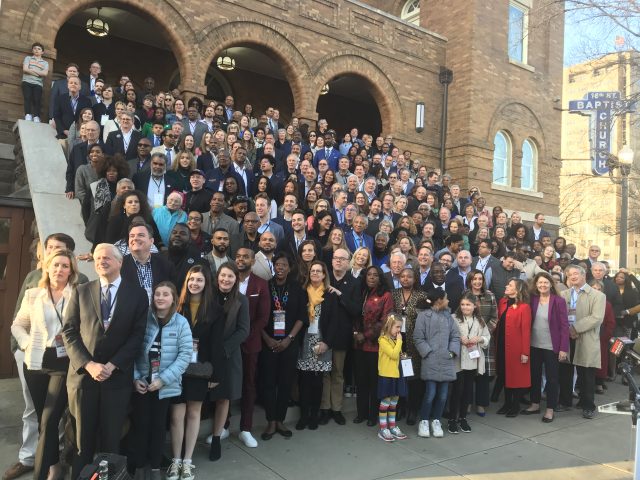
By Erica Wright
The Birmingham Times

More than 40 United States congressional leaders including U.S. Rep. Terri Sewell (D-AL), Sen. Doug Jones (D-AL) and U.S. Speaker of the House Nancy Pelosi (D-CA) gathered in Birmingham Saturday for the 27th annual Congressional Civil Rights Pilgrimage.
The Faith and Politics Institute brought its annual pilgrimage to Alabama, with stops in Selma, Montgomery and Birmingham.
The weekend-long trip through Alabama included a wreath-laying ceremony at the historic Sixteenth Street Baptist Church in downtown Birmingham, where a bomb killed four little girls in 1963.
“I’m humbled every time that I come to this church because the first bill that I ever passed was . . . on the 50th anniversary of the death [of the four little girls],” said Sewell. “We finally gave them the Congressional Gold Medal posthumously… this is holy ground.”
Pelosi made it a point to honor Rep. John Lewis (D-GA), who participated in the Selma to Montgomery marches in the 1960s and has led the pilgrimage for more than 20 years but was not present this year. Lewis is battling Stage 4 pancreatic cancer.
“I have the privilege of serving with John Lewis and . . . we learn by his example and his dedication each day,” said Pelosi. “I told him yesterday, ‘We call you an icon but to become an icon, you were first a troublemaker’, so let that be a lesson for all of us to cause as John calls it ‘good trouble.’”.
The Speaker talked of the sacrifices made by those who participated in the Movement across the state.
“The courage that it took, the success that they had, the determination they had to begin something and to persist to see . . . change and improve our country,” she said, “but [we] also know that our work is not done. We have faith . . . that as people learn more about what happened and how we can make this better for the future in a unifying and not violent way.”
U.S. House Democratic Majority Leader Steny Hoyer (D-MD), making his 15th trip with the group, also spoke of Lewis and the shared humanity of all people.
“As John Lewis would say, we return to Birmingham one more time so we do not forget why it is so important for all of us to stay focused on reaching out to one another,” said Hoyer. “Exercising nonviolent relationships, resolving our problems and our differences not based upon color, agenda or nationality or language but based on our shared humanity.”




